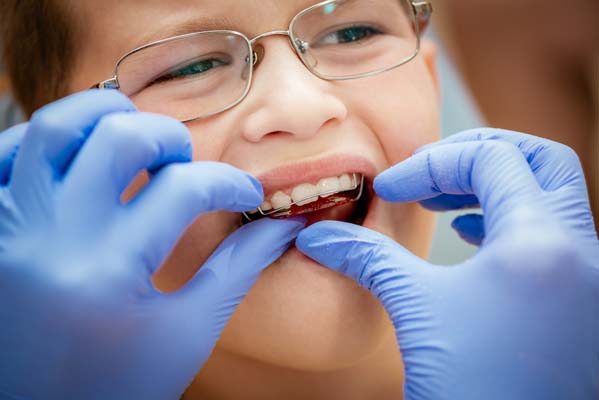Bringing Your Child to a Pediatric Dental Specialist for Early Orthodontic Treatment

As with adults, a child's smile reflects their personality and how others perceive them. The health of their smile depends on numerous things, such as their oral hygiene habits and how often they go to the dentist. However, it can also be affected by orthodontic issues like an overcrowded mouth, an underbite, or crooked teeth. When these issues go untreated, they affect not only a kid's natural dental structure but their ability to eat and speak properly, their immunity to oral diseases, and their self-esteem.
It is important for parents to seek orthodontic treatment as early as possible with a pediatric dentist to avoid future dental problems in the future. This specialized care can also help prevent damage to a child's confidence. Continue reading to learn more about the importance of early orthodontic treatment.
Signs a child may need early orthodontic treatment
Early or late loss of baby teeth
Children typically start losing their primary (baby) teeth by the time they are five years old and will likely have their permanent (adult) teeth by their early teen years. Primary teeth help guide the permanent teeth into the proper position as they erupt. Premature primary tooth loss can cause the teeth around them to shift out of their proper position and lead to crooked permanent teeth.
In comparison, a child can also lose primary teeth too late. If it is stubborn and refuses to fall out, the permanent tooth can erupt behind it and make a second row of teeth. This situation causes the permanent teeth row to be further back than it would be naturally. In addition, if a child's permanent teeth erupt while they still have a lot of baby teeth, the mouth will become crowded with both their primary and permanent teeth.
Difficulty eating or biting
If a child has difficulty chewing their food, they may have an anterior open bite, which is a type of malocclusion. A child with an open bite has slanted front upper and lower teeth that do not touch when they close their mouth. Open bite is typically caused by the following:
- Prolonged thumb or pacifier sucking
- Tongue thrusting
- Temporomandibular joint disorder (TMD or TMJ)
- A skeletal genetic problem
Crossbites
A crossbite is another type of malocclusion where upper teeth fit inside lower teeth. Crossbites can affect a single tooth or groups of teeth, whether front teeth, back teeth, or both. A crossbite is likely caused by genetics, delayed loss of baby teeth, or abnormal eruption of permanent teeth. It can also be caused by prolonged actions such as thumb sucking or swallowing abnormally.
Phases of early orthodontic treatment
While pediatric dental specialists tailor custom treatment based on each child's individual needs, early orthodontic care will often follow two phases: phase 1 (interceptive orthodontics) and phase 2. Phase 1 typically starts when a child is between the ages of 6 and 10 and begins to lose their primary teeth. According to the American Association of Orthodontists, all children should have an orthodontist checkup by the age of 7 to detect whether they have abnormal jaw growth or tooth development. A pediatric dental specialist can better address these issues with children in this age group before their adult teeth erupt. Common phase 1 therapies include:
- Headgear
- Retainers
- Space maintainers
- Limited braces on select teeth
- Expansion appliances
After phase 1, young patients can begin phase 2 of their early orthodontic treatment during their early adolescent years. This treatment phase aims to align teeth for maximum esthetics, function, and stability using braces and special retainers or expansion appliances. In addition, if the child is missing teeth, the orthodontist can replace them, as well as fix or remove teeth that are out of their natural position or fail to erupt in time. In cases where the child has severe jaw development issues, they may need a combination of regular orthodontic care and surgery once their jaw is mature enough to qualify for the appropriate operation.
The benefits of early orthodontic treatment
There are several benefits of bringing a child to a pediatric dental specialist for orthodontic care. It allows the dental professional to identify and treat oral problems at their early stages. Some specific advantages include the following:
- Corrects dental habits, such as prolonged thumb-sucking or pacifier use, that can harm jaw development
- Guides jaw growth
- Helps the proper alignment of permanent teeth
- Improves the child's appearance and self-confidence
- Prevents the need for more extensive treatment as an adult
- Reduces the risk of a crowded mouth
- Reduces the risk of oral health issues (e.g., tooth decay and gum disease)
Schedule an appointment today
If your child is experiencing orthodontic problems, early intervention can improve their long-term oral health, preserve their smile, and help their self-confidence as they grow up. Our pediatric dental team can help you and your child care for their teeth and how to prevent future dental issues. Call our office to learn more or schedule an appointment.
Learn more about early orthodontic dental care at https://www.orthodonticprecision.com or call (703) 391-8800 to schedule an appointment.
Check out what others are saying about our dental services on Yelp: Orthodontics for Children in Reston, VA.
Recent Posts
Are you considering Invisalign® treatment? Read on to learn about some of the benefits of opting for this teeth-straightening treatment. According to the American Dental Association, teeth straightening is more than just for cosmetic purposes; it may help your overall oral health. While conventional metal braces are still widely used, modern technology has enabled the…
Patients undergoing Invisalign® treatment often want to know how long they will need to wear their aligners. Read on to learn how long the aligners need to be worn. Several variables determine the length of Invisalign treatment, and one of the most important is how long you wear your aligners each day.Invisalign treatment can take…
It may take a few days to become accustomed to Invisalign®, as with any orthodontic device. Continue reading to find out more about how Invisalign may affect speech. Invisalign trays fully cover the teeth, giving them a somewhat thicker appearance and feel. Some individuals may notice a little, transient alteration in their speech for the…
While many people want to undergo Invisalign® treatment, they must determine if they are good candidates for the teeth straightening option. Nevertheless, this sleek system is a popular alternative to traditional braces for teens and adults. This article reviews some of the indications that Invisalign may work for you.Invisalign is a system of transparent aligner…


